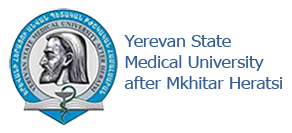The Yerevan State Medical University after Mkhitar Heratsi (YSMU)

The Yerevan State Medical University (YSMU), founded in 1920, is the only medical research university in Armenia able to provide multidisciplinary education and research across the entire medical, scientific and clinical research spectrum. In terms of inter-disciplinarity of the research, regional involvement as well as teaching and learning competences of Faculty of Medicine, YSMU has exceeded other national universities on average. Many of the YSMU students take advantage of international exchange opportunities; therefore, there is a continuous international contact at multiple levels, from institutional through international projects and collaborations, to student-based through international exchanges.
Through its research and education programs the YSMU staff supports creation of innovative projects in different fields of medical genetics, especially cancer genetics promoting collaborations and partnerships with Armenian and international research, educational and clinical institutions. The expertise in research-related educational projects, promotes integration of young researchers in genomics and medical care, especially in the field of cancer genetics. The newly created laboratory of NGS analysis and the laboratory of cytogenetics have the license to conduct diagnostic research for the entire country and as such form the basis of a new healthcare infrastructure system, moving towards precision medicine.
The Department of Clinical Genetics was founded in 2011 with the assistance of specialists having many years of teaching experience in medical, molecular, population genetics, cytogenetics, and cancer genetics. Many members of the department have professorial experience in higher education institutions of Armenia as well as in some foreign universities.
YSMU will be the overall coordinator of the project. Specifically, it will be responsible for WPs 1, 5 and 7. WP1 relates to the identification of possible ethical, legal and organizational challenges and barriers for achieving excellence. It is important to identify potential bottlenecks and try to address those so that the implementation of subsequent training becomes as effective as possible. The output of WP1 would be the creation of a roadmap for achieving excellence through the ARICE project. Additionally, YSMU will lead on the implementation of the expertise on cancer research acquired through the ARICE training opportunities. This would be achieved via active mentoring by the international partners. Lastly, WP7 relates to the overall project management, reflecting the overall coordination responsibility by YSMU.